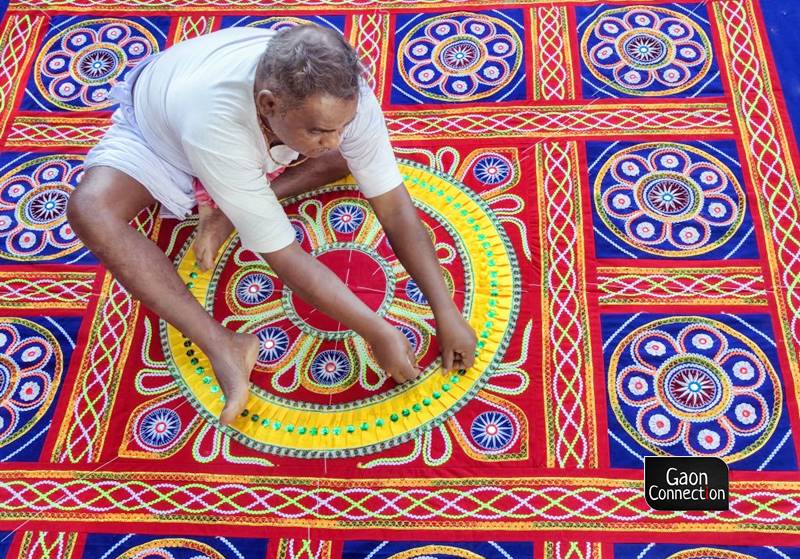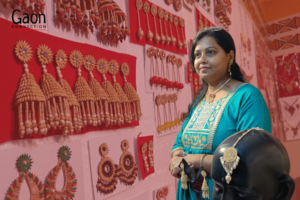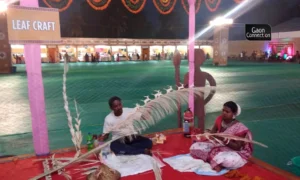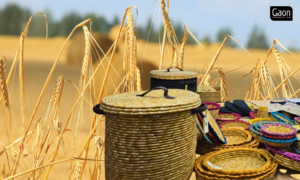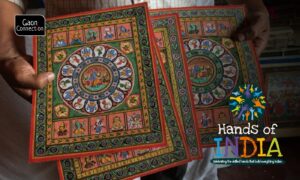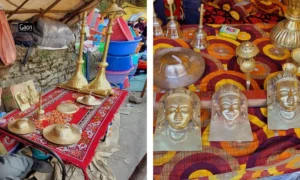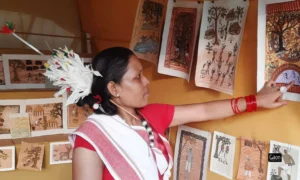Pipili (Puri), Odisha
Lord Jagannath emerges from his abode at the Puri temple along with his brother Balabhadra and sister Subhadra in late June annually, and is taken in a procession in chariots. Odisha’s famous Rath Yatra is attended by millions of devotees. And, an intrinsic part of the Rath Yatra are the bright and vibrant adornments to the chariot – embroidered cloth with the famous Pipili work.
Both men and women in many households in village Pipili in Puri district are engaged in doing applique work on fabric and embellishing it further with hand embroidery.
It is a craft, some say, that goes back to the 12th century, to the time the Jagannath temple was established in the coastal town of Puri in Odisha, about 60 kms south of the state capital Bhubaneswar.
Artisans create the huge cloth canopies that cover the rath in which the Gods travel from Puri to Gundicha, three kilometres away, every year, and return a week later. Motifs from nature and from the scriptures are painstakingly appliqued and embroidered onto the canopies over the wooden chariot, and also cover the umbrellas, fans and other paraphernalia that ensures the divine siblings a comfortable journey.
Also Read: The heritage village of Odisha where every single resident is a pattachitra artist
Around 50 artisans take about two weeks to make canopies and other items to decorate the three wooden chariots and deities during the annual Rath Yatra. Besides the Rath Yatra that forms a significant part of their work and business, they also make and sell their work elsewhere, especially at crafts fairs both in Odisha and outside the state. All that has ground to a near halt.
According to Samir Mohapatra, a 43-year-old artisan of Pipili in Puri district, things were not so bad before the pandemic. “An artisan earns around Rs 9,000 to Rs 15,000 per month. However, things look bleak for the artisans who are engaged in Pipili work. And for many of them their sales have dropped to zero,” he told Gaon Connection.
The buzz and the excitement of creating works of art for their gods is subdued. Because, besides the canopies and other work they did for the rath yatra, tourists who bought their applique work have reduced drastically.
The third wave of the pandemic has left them with no takers for their handcrafted works of art. Even six months ago, things had just begun to look up when the second wave showed signs of subsiding. But, the pandemic did not go away as everyone had hoped and since December, with a surge in Covid-19 cases, the government was forced to impose night lockdown and other restrictions in the state from January 7, 2022.
Also Read: As they sew, so they reap: Women in Bihar use Sujani embroidery to empower themselves
“This has been a source of livelihood for us since the time of our ancestors. The third wave and lockdown have caused us a lot of grief,” Bharat Mohapatra told Gaon Connection as he pointed to his unsold stocks of Pipili work.
Odisha’s Pipli art
Debaprasad Mohapatra, a 60-year-old Pipli work artisan, explained the craft. “It is embroidering and stitching. The word Appliqué comes from the French word meaning ‘to put on’, where shapes of flowers, etc., are cut out and stitched on to the main fabric surface,” Debaprasad elaborated.
“Pipili appliqué work owes its origin to Lord Jagannath since the 12th century. During the annual Rath Yatra, artisans decorate three wooden chariots and deities on the chariots with colourful appliqué clothes, umbrellas and other items,” he said.
Over the years, the appliqué work has adorned pillowcases, hand-fans, bags, umbrellas, lamp shades and so on. Popular motifs are of peacocks, ducks, parrots, trees, elephants, flowers, and of course the deities.
For nearly three years, Pipili’s appliqué work has declined dramatically due to coronavirus, leaving the artisans without a source of livelihood. “There is also a ban on devotees visiting the Jagannath temple,” complained 35-year-old Nanda Mohapatra from Pipli.
The stalls all along the way to the temple, that would be stocked with applique work are lying desolate, as there are no visitors to the temple who would often buy the beautiful embroidery work.
“We were teetering on the edge already with the two years of the COVID-19 pandemic, and it looks like the third wave will push us over the edge,” Abhaya Mohapatra, a craft shop owner at Pipli, told Gaon Connection.
Also Read: For many women artisans, traditional embroidery is a passport to self-empowerment
Losses running into crores
Appliqué craft is estimated to have taken a hit of at least Rs two crores last year due to the pandemic in Pipili. “The losses could deepen further this year with the third wave of the COVID-19 and lockdown,” worried Ramani Ranjan Mohapatra, also a craft shop owner.
“The coronavirus pandemic upended our world. We need more orders from export houses to make it through the rough waters,” Narendra Mohapatra, a 54-year-old craftsperson, told Gaon Connection. “Those with a strong financial base managed to cross their hurdles last year, but it is getting increasingly difficult for the artisans as there are no festivals, tourists, and therefore no demand at all for their work,” he added.
“The government is chalking out a plan to help the craft-persons,” Bipin Rout, joint chief executive officer of the government-run Odisha Rural Development and Marketing Society, assured Gaon Connection.
“At present there are about 15,000 artisans in Puri and Khordha districts who depend on the applique craft for their livelihoods. Sixty per cent of them are women. But, due to the third wave, and the fact that all craft melas in the state are banned, the fate of a large number of these craft-persons is at stake,” he acknowledged.
Also Read: To beat the lockdown blues, traditional artisans of Kachchh in Gujarat go online

